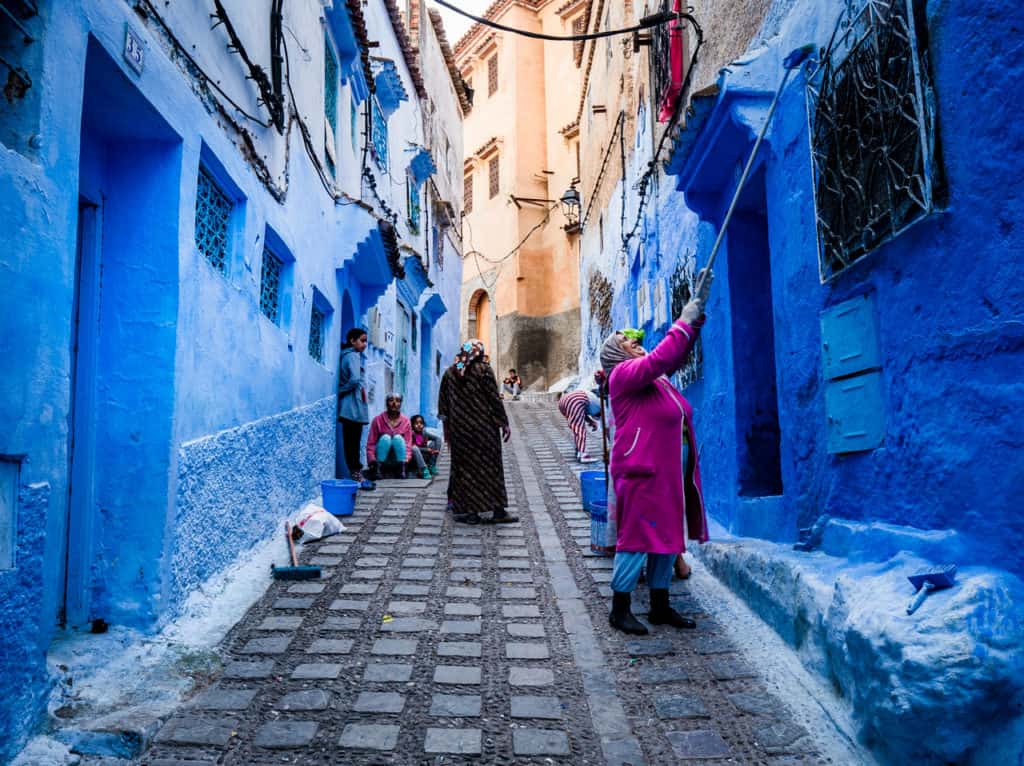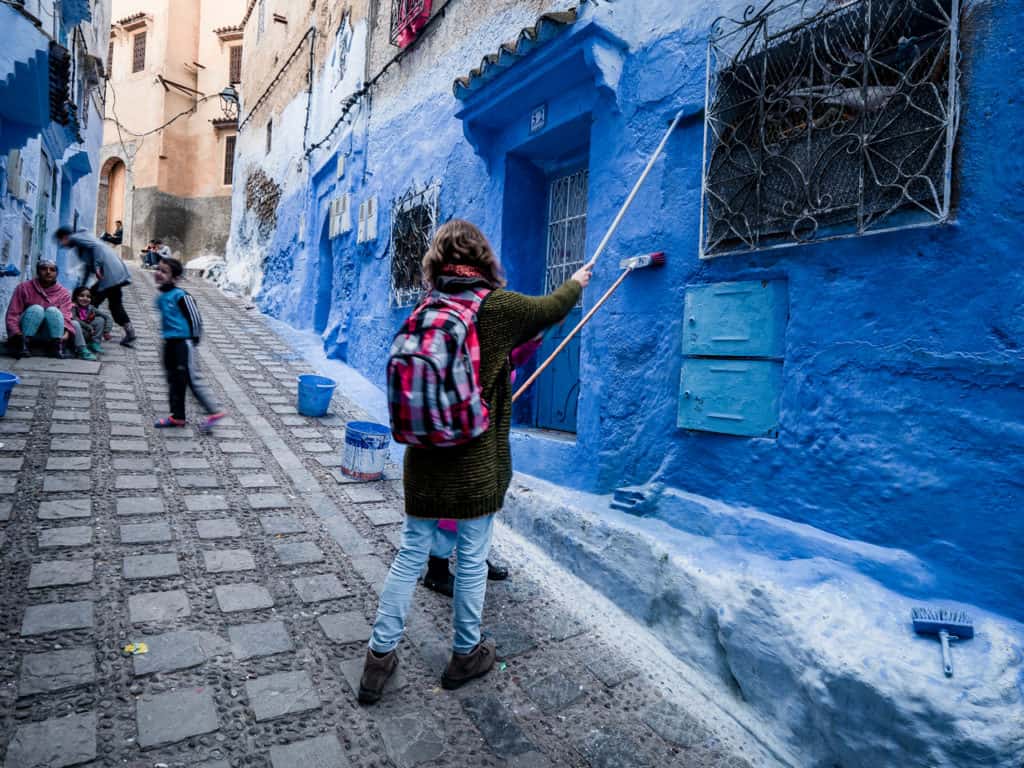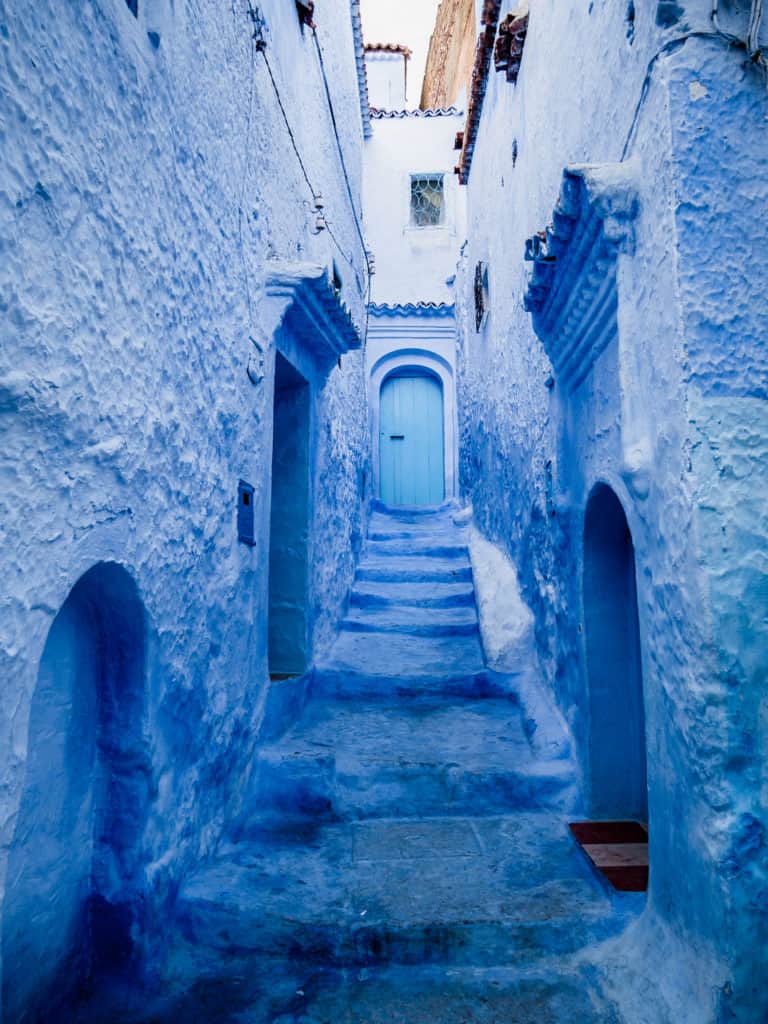Bleu City
12 Best things to do in Chefchaouen, the Blue City of Morocco
This is a comprehensive travel guide to Chefchaouen, the Blue Pearl of Morocco. I’ll tell you what are the top things to see and do in and around Chefchaouen, where to stay, how to get there and how to leave from Chefchaouen in Morocco.
Chefchaouen is a small city in the Rif mountains in the north-west of Morocco. This quirky town is probably one of the prettiest I’ve seen in Morocco because of its blue-washed streets and buildings. That’s why it got nicknamed “the Blue Pearl of Morocco”.
It’s such a popular town in Morocco that it’s often considered one of the best places to visit in the country!
There are many different theories to why Chefchaouen is so blue.
Some say that the shades of blue on the walls keep the mosquitoes away, others believe that the blue helps to keep the houses cool during the warm summer months.
The most popular theory is that it was painted blue by the Jews who fled to Chefchaouen to escape the Spanish Inquisition in the 15th century.
Whatever the true reason for the blue color might be, up until today the locals still apply a fresh coat of paint on their houses about twice a year.


Chefchaouen used to be a hidden gem in Morocco but since the rise of Instagram and Pinterest, it became a very touristic place. After spending one year in Central Asia and Kyrgyzstan, I wasn’t used anymore to seeing so many backpackers in one place.
If you visit Chefchaouen during the low season (from late autumn to early spring) like I did, you can avoid the biggest crowds. The only downside is that it often rains and it can get really cold during the winter as Chefchaouen is located in the mountains.
Although I’m not so fond of visiting tourist destinations, I have to say that I really enjoyed my visit to Chefchaouen. It’s still a unique experience and a photographer’s paradise!
The amount of time you want to spend in Chefchaouen really depends on what you want to see and do. If you only have a limited amount of time in Morocco, I’d say that one full day should be enough to discover the ‘Blue Pearl’ as the old medina (Moroccan word for ‘city’) of Chefchaouen isn’t very big. 
You can always book a day trip to Chefchaouen from Tangier or from Fez if you’re on a tight schedule. Click here to check prices for a guided day trip to the Blue City.
If you like to explore some beautiful places in the nearby Rif Mountains, foresee at least a couple of days in the region.
If you like to explore some beautiful places in the nearby Rif Mountains, foresee at least a couple of days in the region.
Hiking to the waterfalls of Akchour (see things to do around Chefchaouen)
Fun things to do in Chefchaouen in Morocco
1) Get lost in the maze of streets
This might sound cliché but the old medina of Chefchaouen is really the place to get lost.


There are so many small streets that you literally will lose your way at some point. You’ll discover many enchanting squares, doors and dead-end alleys that are all very photogenic.


It’s also a fun way to see how the locals live. A few times we got invited by a baker or a weaver to visit their workshop and learn a bit more about their lifestyle (it helps if you speak some French or Moroccan Arabic!).

However, be respectful towards the local people when it comes to taking photos. They don’t always like having pictures of them taken, especially when their children are around. Ask first for their permission.
If you want to take some pictures without having tons of people on them, you should hit the streets before 9 am.
Chefchaouen starts coming to life around 10 am so you’ll have enough time to wander through the alleys without seeing a living soul, with the exception of the cats (and there are many of them!!).


2) Visit the Souk (market)
If you happen to be in Chefchaouen on a Monday or a Thursday, you should definitely visit the “souk”, the Moroccan word for market.
During these days the farmers of the Rif valley come down to the streets of Chefchaouen’s old medina to sell their products. This can vary from fruits and vegetables to handmade crafts and mountain herbs.
3) Shop at one of the many little bazaars
Many of the small streets in Chefchaouen are occupied by little bazaars that sell local crafts, arts, clothes, and traditional souvenirs. It’s a treat for the eye to see all the colorful wares being displayed against the blue walls.

At times it can feel a bit claustrophobic as there isn’t much space to walk when all the wares are out but it surely is a sensory experience to wander through all the little bazaars. You’ll also come across many workshops where you can see the locals craft their goods.

4) Learn about Chefchaouen’s history at the Kasbah museum
If you don’t only want to enjoy the aesthetics of the Blue city but also learn more about the history, customs, and art of the Chefchaouen region, you should pay a visit to the Kasbah Museum.
This ethnographic museum is located in the center of the old medina, right near Plaza Uta el-Hammam and is surrounded by a beautiful lush garden.

5) Enjoy the panoramic view from the Spanish mosque
The best place to enjoy a beautiful panoramic view of Chefchaouen is at the Spanish mosque. This mosque sits on a hill to the east of the city and it’s a 45-minute walk to get there.
The trail begins from Bab al Ansae, the medina’s eastern gate and passes a river where you might spot some women doing their laundry.
The best time to hike up there is on a clear day before sunrise or sunset, during which you’ll have a spectacular view over the blue city and the peaks of the Rif mountains.
If you don’t feel like making this hike, you can always find a rooftop terrace (many hostels and hotels have one) from which you can enjoy the sunrise or sunset over the city.

6) Get a good scrub at a local hammam
If you happen to be in Chefchaouen on a rainy day, it could be a good opportunity to visit one of the local hammams and experience a traditional Moroccan massage. There are a few hammams in Chefchaouen within a different price range.
For a real local experience, you should visit Hammam El Harras, where you’ll be bathing between the local people. However, read what to expect from a traditional Moroccan hammam to be prepared…
If you prefer more luxury and privacy, the Lina Ryad and Spa is known to be the best hammam of Chefchaouen.
7) Enjoy the nightlife of Chefchaouen
Don’t expect to find nightclubs or bars in Chefchaouen. The only place where you might find some alcohol is at the bar of Atlas Chaouen or Hotel Parador but according to the Lonely Planet, there isn’t much ambiance in either hotel.
However, a nice place to enjoy the evenings is Plaza Uta El-Hammam in the heart of Chefchaouen’s old medina. The square is lined with restaurants and little cafes where you can enjoy a traditional Moroccan dish or tea while breathing in the local atmosphere of the plaza.

8) Smoke hashish and chill
It might be hard to find alcohol in Chefchaouen but you surely won’t have trouble finding hash! Everywhere you go, you’ll get the hint of hashish filling the air.
I had no idea but apparently, Chefchaouen is quite notorious for being the hashish hub of Morocco. Niko and I got offered some hashish by local dealers at least 8 times per day.
The rooftop terrace of our hostel was bathing in a thick aromatic cloud of hashish smoke from chilled-out backpackers. I didn’t even have to smoke a joint to feel high when I was enjoying the sunset there…
I can’t tell you how much the hash costs as we don’t smoke it but apparently it’s very cheap and you won’t likely get in trouble for buying and smoking it in Chefchaouen.
Things to do around Chefchaouen: day trips and hiking in Chefchaouen
While you’re in Chefchaouen and you have a spare day or two, you shouldn’t just admire the surrounding mountains from the streets but go on a hike or on a day trip to enjoy the beauty of the Rif Mountains.
The best time to hike in the Rif Mountains is from April to October but if you can handle some cold and possibly snow, you can hike all year round as long as you’re well-prepared!
1) Go on a scenic hike in the Rif Mountains
There are a few nice hiking trails that start just outside the city center of Chefchaouen and lead into the nearby Rif Mountains.
A popular one is a pathway that leads just behind the waterfall of the Ras el’Ma River while hiking into the direction of the Spanish mosque (see number 5 in the list of things to do in Chefchaouen above).
2) Hike up to Jeb al-Kalaa
The trail to Jeb al-Kalaa, the peak overlooking Chefchaouen, is a scenic but intense hike. You definitely have to have a certain level of physical fitness to be able to walk all the way up and back.
The hiking trail isn’t always well-marked so you need to keep an eye out for the white and yellow markings if you don’t want to get lost. The whole loop can take about 9 hours so wear comfortable hiking shoes and bring enough water and snacks.
The trailhead starts near the campground located above the old city.
3) Visit a marijuana farm
Along the two hiking trails mentioned above, you’ll come across some marijuana farms. If you’re interested in how to hashish is produced, you can visit one of these farms during the month of November once the harvesting of the plants is done.
However, ALWAYS ask permission first as not all the farmers are happy to have visitors.
They are generally very friendly and are very likely to show you the process of making the hashish as long as you don’t take any photos to protect their privacy. A small tip or contribution (anywhere between 50 and 100 dirhams) is also always appreciated.
I wouldn’t recommend visiting any of these farms during the summer and early autumn months, while marijuana is still growing. The farmers might not appreciate unwanted visitors during this time of the year…
4) Day-trip to the Akchour Waterfalls and God’s Bridge
The Akchour Waterfalls and God’s Bridge are two very special places near Akchour, a small town located at a 45-minute drive from Chefchaouen.
The Akchour Waterfalls are possibly the most beautiful waterfalls I’ve seen in Morocco and God’s Bridge is a very unique rock formation that looks like a stone arch standing over the Akchour river.
Both places are located near each other and can be visited within one day if you get there early enough.
5) Go on a trek at the Talassemtane National Park
The Talassemtane National Park was created in 2004 to conserve the last of Morocco’s fir forests. Talassemtane means ‘cold spring’ in Berber, named after the many cascades and waterfalls you can find in the park.
One of the most popular trails in the National Park are the ones to the Akchour Waterfalls and God’s Bridge (see above) but you can also go on a multiple-day trek all across the National Park.
Where to stay in Chefchaouen
1) Low-budget hostels
Although Chefchaouen is a very popular destination, it won’t cost you much to spend the night in the old medina. There are a few low-budget hostels, starting from $6 per person for a bed in a dorm.
If you’re planning on visiting Chefchaouen during the summer, it’s good to make a reservation in advance. It’s also good to check the reviews on hostels as a lot of them have some bed bug issues…
Niko and I shared a private room at Hotel Souika. It’s the cheapest hostel in town and has several dorm rooms as private rooms.
There’s also a fantastic rooftop terrace from which you have a great view of the city and mountains. Click here to see the prices and availability of Hotel Souika.
Another hostel we recommend is the Dar Bleu Pearl.
2) Mid-range hotels
If you like to have a bit more luxury, you can always book a room at one of the many mid-range hotels in the old medina of Chefchaouen. Prices vary from $30 to $60 per room per night.
I recommend:
3) Luxurious hotels in Chefchaouen
If you’re looking for a more luxurious stay in Chefchaouen, you should book a night at Riad La Santa.
If you really want to indulge yourself, why not stay at the Lina Ryad & Spa!
Do you have more questions about Chefchaouen? Have you been to Blue city before? Please ask your questions or share with us your experiences in the comments below.



